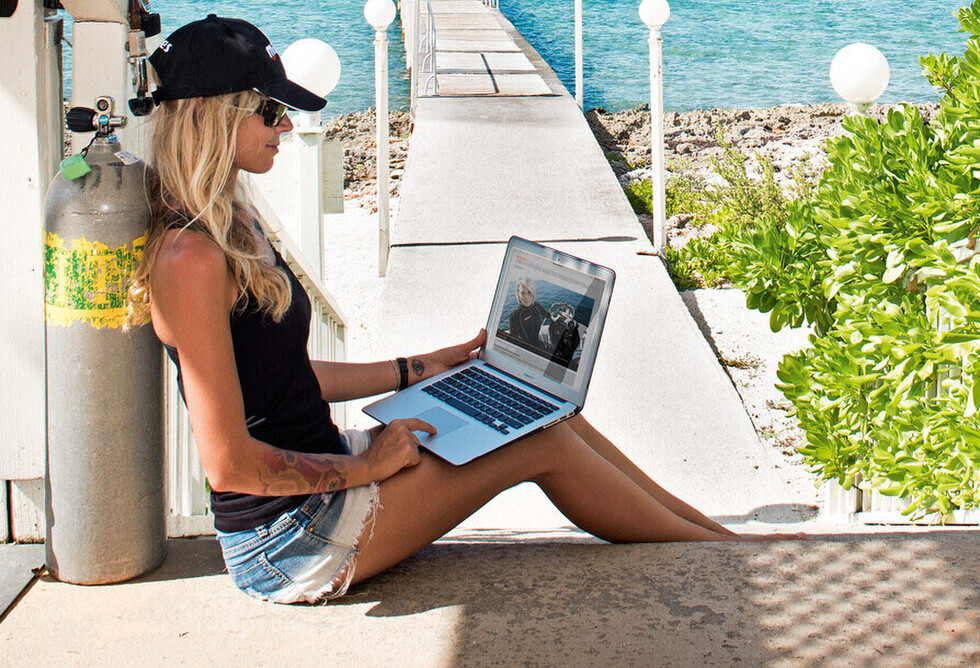Why peeing in your wetsuit is not a good idea.
It is said there are two types of diver, those that pee in their suit and those that lie about it. I can reveal today there is a third, those that don't!
Thankfully I stopped wetting myself when I was around 5 years old but I do still feel the effects of immersion in water, what is going on? This interesting dilemma can be explained with an understanding of dive physiology.
The phenomenon is known as immersion diuresis and occurs whenever the body is emerged in water. Immersion, along with a water temperature that is colder than air, causes narrowing of the blood vessels in the extremities. This vasoconstriction occurs primarily in the skin and superficial tissues of the body as well as in the muscles of the arms and legs. The result: An increased volume of blood is sent to the central organs of the body such as the heart, lungs and large internal blood vessels.
The hormone that controls the production of urine by the kidneys is called antidiuretic hormone (ADH). It controls when and how much urine your kidneys make. The increased blood volume to the major vessels is interpreted by your body as a fluid overload. This overload causes ADH production to stop, which in turn allows the kidneys to immediately produce urine to lower the centrally circulating blood volume - the body's automatic response to preserve blood volume.
Once you exit the water, circulating blood volume returns to near normal - less the fluid taken to produce urine, which is quickly replaced as the body draws fluid from body tissues, such as muscles. Unfortunately, you probably will also leave the water with a full bladder.
Since we are all subject to the same phenomenon underwater, this is probably your normal response to immersion. If this situation causes problems like urinary tract infections, see your doctor. If your coffee is caffeinated, you may wish to switch to a decaffeinated brand, as caffeine is a known diuretic that also interferes with the production of ADH.
Peeing in your wetsuit is just gross. Your wetsuit is going to stink and harbour bacteria and will certainly need a good long soak in a tub with a good quality purpose made wetsuit shampoo. Also worth considering is that human urine is 90-95% water, the rest are compounds like urea, chloride, sodium, potassium, creatinine, inorganic sulphur, and other chemicals. This means that it is slightly acidic and its pH ranges from 5.5 to 7. In other words, urine is corrosive. The habit of urinating on the wetsuit will gradually affect its qualities, make it stiffer, and less comfortable, i.e reduce its service life.
As well as urine causing damage to your wetsuit, a soiled, unwashed wetsuit can cause a skin condition similar to diaper rash. Pee proponents often describe how a mid-dive release can make a cold dive much warmer. Unfortunately, the effects are temporary and counter-productive.
Warm urine fools your body into thinking it’s no longer in a cold environment. So when cold, fresh water enters your suit, your body isn’t prepared. Now you’re worse off than before and your body must expend extra energy warming up that cold water. If fresh water isn’t being introduced, either because your suit has great seals, or you haven’t “flushed,” that means you’re soaking in your own urine. That’s gross. Also have some consideration for whomever may be having to wash your suit post dive.
What effects urine has on the skin has mixed responses. Obviously smelling like the rhino house at the zoo can't be good for your flesh however Urine therapy," as it's dubbed, has a long and storied history as a skin-conditioning treatment. Beginning in Indian culture at least five centuries ago, the practice made its way to the Egyptians, Greeks, and Romans, was popular during the Middle Ages and Renaissance, and even found its way into the baths of 18th-century French women. On that note let's discuss hydration:
It’s never a good idea to dive dehydrated. Not only does dehydration increase your chance of decompression sickness, the body is naturally inclined to create urine when submerged in water. It's worth pointing out that hydration prior to diving should commence 24 hours prior to a dive.
So how do we overcome this phenomena? Firstly getting to know your body a little more and a little better. This is where the SSI Free diver course can really come into play, Scuba divers dive to look around - Freedivers dive to look instead.....right?
Prior to diving I will hydrate not too much, not too little and know precisly when to cease hydration (about 1 hour prior to immersion) and the final phase before the drysuit (wetsuit) is zipped up is a trip to the toilet. With practice it is easy to manage an hour dive with no urge to wet oneself.
If you want to learn a little more about diving physics, physiology and how your body can work for you, join me on the next SSI Free diver course or if you want to learn more about your dive equipment and how to take care of it why not sign up to the SSI Equipment Techniques program?
Until next time - Don't eat yellow snow...
🔚


